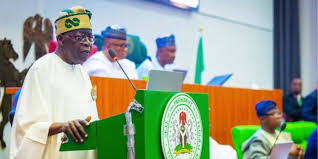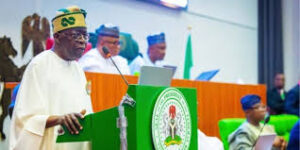In a bold move to fund his administration’s ambitious agenda, President Bola Ahmed Tinubu has requested the National Assembly to amend the 2024 Appropriation Act by increasing the budget by a staggering N6.2 trillion. This would raise the total budget from the initially approved N28.7 trillion to a whopping N34.9 trillion.
The president’s letter, read on the floors of both the Senate and the House of Representatives, outlined the rationale behind the proposed budget increase. Tinubu has requested the allocation of an additional N3.2 trillion for capital expenditure, aimed at financing “renewed hope infrastructure projects and other critical infrastructure projects to be undertaken across the country.” Furthermore, he has sought an additional N3 trillion to meet the federal government’s recurrent expenditure requirements.
To fund this significant budget expansion, Tinubu has proposed a new tax measure – a “windfall tax” on the foreign exchange (forex) gains of Nigerian banks. This move comes in the wake of reports that the top seven local banks in Nigeria raked in a combined profit of N3.3 trillion in 2023, a substantial portion of which was attributed to forex revaluation gains.
The president’s letter stated that the funds for the budget increase “shall be funded by accruing to the federal government of Nigeria,” suggesting that the proposed windfall tax on banks’ forex gains will be the primary source of revenue.
This bold fiscal move by the Tinubu administration underscores the government’s determination to accelerate the country’s development and address pressing infrastructure needs. The proposed budget increase, if approved by the National Assembly, would represent a significant departure from the previous administration’s fiscal policies and signal a shift towards a more expansionary approach to government spending.
However, the decision to impose a windfall tax on banks’ forex gains has raised eyebrows among industry stakeholders. While the move is aimed at generating additional revenue to fund the government’s ambitious plans, there are concerns about the potential impact on the banking sector and the broader economy.
“The banks have been a significant contributor to the country’s economic growth, and any measures that could potentially disrupt their operations or profitability should be carefully considered,” said Chike Okafor, a financial analyst at a leading investment firm.
Nonetheless, the Tinubu administration appears undeterred, as it seeks to strike a balance between fiscal prudence and the need for transformative investments in infrastructure and public services. The proposed budget increase and the new tax measure are expected to face scrutiny and debate in the National Assembly, with lawmakers tasked with ensuring the government’s plans align with the country’s long-term economic interests.
As Nigeria navigates the challenges of the post-pandemic era, the Tinubu administration’s bold fiscal moves signal a determination to chart a new course for the country’s development. The success of these initiatives will be closely watched by both domestic and international observers, as Nigeria seeks to unlock its full economic potential and deliver tangible improvements in the lives of its citizens.





